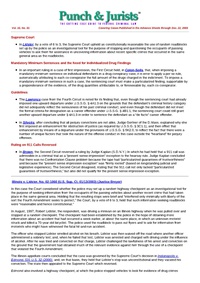With her typical thoroughness and perspicacity, Judge Gertner explained why she first imposed a sentencing enhancement for obstruction of justice pursuant to U.S.S.G. § 3C1.1 based on the defendant’s perjury at trial, and then offset that enhancement by concluding that the nature of the perjury at issue was outside …
Here the Court rejected a series of constitutional challenges to the validity of the anti-gratuity statute - 18 U.S.C. § 201(c)(3), holding, inter alia, it did not violate the First Amendment and that it was not unconstitutionally vague.
The defendant in this case entered a conditional plea of …
As if the Guideline provisions dealing with “career offenders” were not already tough enough, we now have to deal with upward departures based on a sentencing court’s judgment that a defendant who does not meet the technical requirements for career offender status can still be sentenced as a “de …
Here a divided Court upheld as constitutionally reasonable the use of random roadblocks set up by the police as an investigational tool for the purpose of seeking information about a recent crime that occurred in the same general area as the roadblock.
In this case the Court considered …
In this case the defendant challenged the decision entered by the District Court for the Southern District of Texas that convicted him of conspiracy and mail fraud, and sentenced him to 121 months imprisonment.
The defendant contended that both his trial and appellate counsel were ineffective in failing to …
Here the Court held that, when imposing a mandatory minimum sentence on individual defendants in a drug conspiracy case, it is error to automatically attribute to each defendant the quantity of drugs charged in the indictment.
The Third Circuit recently reported a decision, U.S. v. Phillips, 349 F.3d …
Here the Court reversed Judge Kaplan's decision reported at 229 F.Supp.2d 298 in which he ruled that a 911 call was admissible into evidence as a "present sense impression" exception to the hearsay rule under Rule 803(1).
In this decision, the Second Circuit held that the use of …
Defendant appealed a judgment from the United States District Court for the Middle District of Florida, which convicted him of five counts: mail fraud conspiracy, money laundering conspiracy, and three counts of mail fraud. Defendant raised various challenges to both his convictions and sentencing.
Given the absence of any …
